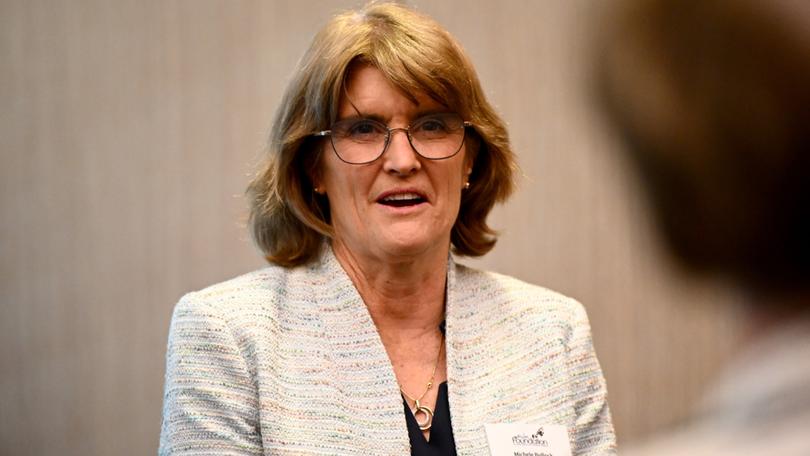Michele Bullock says Aussies won’t be ‘tossed out of their jobs’ as RBA focuses on hot labour market
Michele Bullock says Australians won’t be “tossed out of their jobs” as her Reserve Bank keeps a close eye on the strong labour market before making any move on interest rates.

Michele Bullock says Australians won’t be “tossed out of their jobs” as her Reserve Bank keeps a close eye on the strong labour market before making any move on interest rates.
Ms Bullock said the central bank was “not ruling anything in or out” after holding the official cash rate at 4.35 per cent on Tuesday.
The governor highlighted the booming jobs market and hot inflation in services — items including education, health and rents — as among the key reasons the RBA would not definitively rule out a hike.
Sign up to The Nightly's newsletters.
Get the first look at the digital newspaper, curated daily stories and breaking headlines delivered to your inbox.
By continuing you agree to our Terms and Privacy Policy.Australia’s unemployment rate is not far off multi-decade lows at 4.1 per cent and more than 430,000 people found work in the past year.
Those numbers have consistently outperformed the expectations of most economists in recent months.
“We still have a labour market which looks on the tight-ish side,” Ms Bullock told a press conference in Sydney.
“There are signs that some of the easing in the labour market might have stabilised a bit. Youth unemployment for example has stopped rising, (and) average hours worked isn’t declining as much as it was.”
Interest rates help bring rising prices under control by slowing demand and it’s broadly expected that squeeze should also lead to a higher unemployment rate.
But Ms Bullock knocked back the claim that a big number of Australians would need to lose jobs to get inflation under control.
She said the RBA was forecasting employment would grow more slowly than the labour force — meaning new workers might need to search longer for roles or take positions different to what they expect.
“It’s not that people are being tossed out of work like in a recession,” Ms Bullock said.
“I’d like to get away from this idea that just because the unemployment rate rises people are being tossed out of jobs. That’s not actually what we’re forecasting.”
Judo Bank’s Warren Hogan said the RBA was “performing well on their employment mandate, but inflation remains above the target band”.
He said the central bank would likely leave the cash rate unchanged for the next year.
“They are prepared to remain patient, but if they are pushed into action in the next six months, we continue to expect a hike rather than a cut,” he said.
EY chief economist Cherelle Murphy listed the strong labour market alongside poor productivity and robust government spending as reasons the RBA would remain vigilant.
Ms Bullock’s comments on Tuesday also focused on “elevated inflation” in services, which she said was running at an underlying rate of 5 per cent.
“That’s still a significant amount of inflation in the system,” she said.
“What that’s suggestive of is demand is still above supply.”
That means spending is above the level the business and workers in the services sector can produce.
Data from the Australian Bureau of Statistics showed education costs were up 6.4 per cent and rents 6.7 per cent in the year to September.
Prices in the services sector tend to adjust more slowly because wages are a bigger factor in costs for businesses — making the RBA’s job tougher.
The pain has been particularly hard in housing amid very low vacancy rates, but there was a glimmer of hope for struggling tenants.
“Growth in advertised rents has slowed more than expected in recent months and this will flow through to lower CPI rent over time,” Ms Bullock said.
The Federal Government’s move to boost rent assistance would also ease the pressure, the RBA analysis showed.
Originally published on The Nightly
